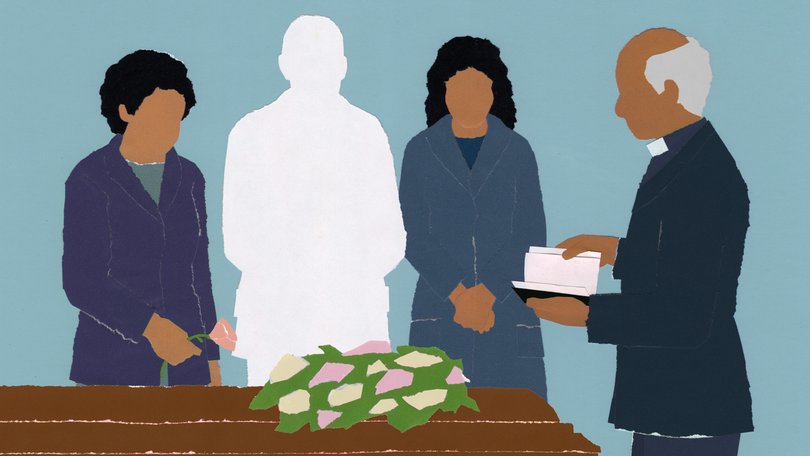THE NEW YORK TIMES: I cut ties with my mother years ago, should I attend her funeral?
THE NEW YORK TIMES: ‘Given the immense pain and suffering she’s caused, I’m questioning whether it’s worth attending her funeral.’

Q: I’ve been estranged from my 93-year-old mother for over 13 years, due to a lifetime of verbal and emotional abuse directed at me and, eventually, my wife and children. To protect my family, I severed all contact.
Although I attended my father’s funeral, I’m torn about attending my mother’s. Given the immense pain and suffering she’s caused, I’m questioning whether it’s worth attending her funeral.
Should I prioritise closure or respect, or simply let go?
Sign up to The Nightly's newsletters.
Get the first look at the digital newspaper, curated daily stories and breaking headlines delivered to your inbox.
By continuing you agree to our Terms and Privacy Policy.From the therapist: It sounds like you made a difficult decision 13 years ago that has served you and your family well. I imagine you came to that choice after much reflection about what it means to love and be loved, what we owe the people who raised us and what kind of respect you and your family deserve to receive.
You examined your underlying goal (to end the cycle of abuse) and its alignment with your values (families should feel safe and nurturing).
Now you’re facing what many adult children of abusive parents confront: the complicated territory of death and its rituals. If you can do the same kind of searching beneath your question, you’ll arrive again at what feels right for you.
As you go through this process, it might help to remember that funerals are more for the living than the dead. This choice is less about whether your mother deserves your presence than it is about what you need to feel at peace with yourself.
To figure that out, frame your question like this: What does this funeral represent for me? Does it feel like a new level of freedom from the pain this relationship has caused you?
Is it a symbol of filial duty completed? Is it a way of honouring a story that shaped you and honouring your courage to protect your family from harm? Is it a space to witness and grieve — not just the end of a life, but the end of the possibility that your mother would change?
Try not to focus on closure, because closure rarely comes from a single point in time. Every day that you chose your family’s well-being over the limitations of what your mother could offer was a day you moved toward closure.
I once had a therapy patient I’ll call Dave, who asked himself a similar question about his own parent’s funeral. His father was a bully — demeaning, critical. When his father was dying, Dave was 50 years old, married with children of his own.
He struggled for months with how to handle the funeral. Then, as his father lay on his deathbed, he had reached out for his son’s hand and said, unexpectedly, “I wish I’d treated you better.”
Instead of feeling relieved, my patient was angry; did his father expect absolution now, at the eleventh hour? The time to make repairs, he felt, had long passed. You don’t automatically get the gift of forgiveness from a deathbed confession.
“I don’t forgive you,” Dave told his father. After all the pain his father had put him through and all the work he’d done to create a good life for himself and his family, he couldn’t bring himself to soothe his father now.
But something shifted. He felt not forgiveness, but compassion for the sad, dying man who must have had his own pain. It was that compassion that allowed Dave to show up authentically at his father’s funeral, even without forgiveness. This felt healing for Dave.
I share this to say that if you decide to go to your mother’s funeral, it doesn’t mean you forgive her. It doesn’t even mean you respect her. It just means you showed up for reasons that made sense for you.
If you stay home, it doesn’t mean you’re cruel or vindictive. It simply means that not going was in the best interest of your psychological well-being.
If you do go, consider what kind of support you’d like; is there someone you want to accompany you as you bear witness to this ending, or a mantra you might prepare to soothe yourself, no matter what feelings come up?
If you decide not to go, you might want to find another way to mark your mother’s passing and process what her death means to you.
You can visit a place that holds meaning for you, light a candle or honor the parts of your relationship (if any) that you remember fondly. Even if there were good times, those moments don’t erase the parts that made you cut contact.
Whatever you decide, your attendance or absence isn’t a statement about your mother’s parenting or your worth as a son.
It’s a reckoning with the complicated story of you and her and how ultimately — either way — you became the protagonist and the hero, creating a new legacy for you and your family.
This article originally appeared in The New York Times.
© 2025 The New York Times Company
Originally published on The New York Times
